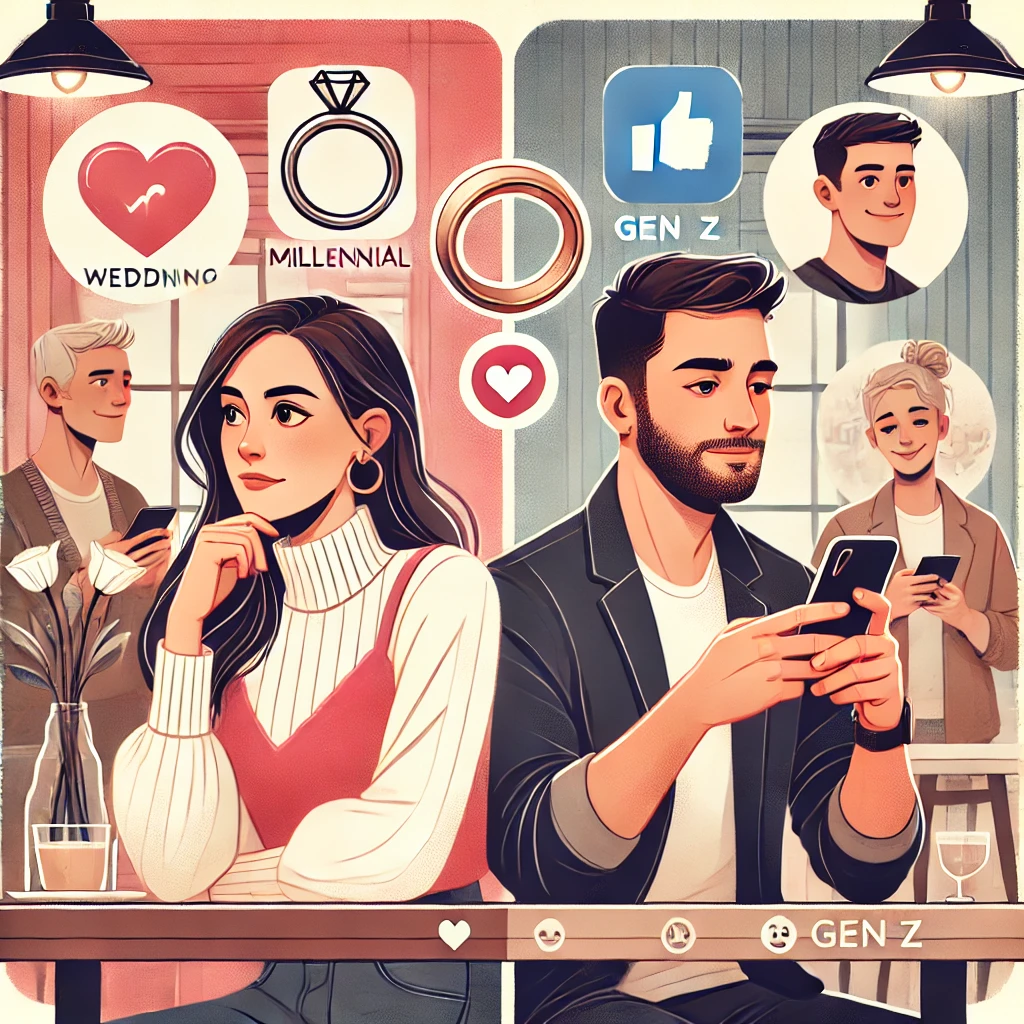
Marriage isn’t the finish line it once was. For many Millennials and Gen Z, love and commitment look different than they did a generation ago. While some still dream of walking down the aisle, others are redefining what it means to be in a serious relationship — or opting out of traditional models altogether.
This article explores how Millennials and Gen Z approach love, marriage, and long-term commitment. We’ll break down trends, motivations, and the social forces shaping their choices.
Relationship Trends Among Millennials and Gen Z
Both Millennials and Gen Z are pushing back against long-held ideas about relationships. Here’s what the data shows:
- Marriage is on the decline. According to Pew Research, only 44% of Millennials were married by age 40, compared to 61% of Gen X at the same age.
- Cohabitation is up. More couples are choosing to live together without tying the knot.
- Non-traditional setups are growing — from polyamory to “situationships,” younger people are experimenting with new relationship models.
Key influences:
- The economy (cost of weddings, housing, childcare)
- Increased education and career focus
- Exposure to diverse lifestyles via the internet and social media
Why Millennials Are Postponing (or Skipping) Marriage
Millennials are more likely to delay or even skip marriage for practical reasons:
- Financial strain: Many are juggling student loans, high rent, and stagnant wages.
- Fear of divorce: Growing up during a time of rising divorce rates made them more cautious.
- Prioritizing personal growth: Travel, career advancement, and self-development often come first.
- Changing gender roles: More equal partnerships have shifted expectations and timelines.
According to sociologist Stephanie Coontz, “Millennials aren’t anti-marriage. They just want to do it once, do it right — and do it later.”
Gen Z’s Attitudes Toward Love and Commitment
Gen Z, currently in their teens and twenties, brings a different mindset entirely:
- Fluidity over labels: They’re more open to exploring identity, sexuality, and non-traditional relationships.
- Mental health comes first: Many prioritize emotional well-being over romantic milestones.
- Skepticism of institutions: This includes marriage, which is often viewed as outdated or unnecessary.
- Dating app natives: Growing up with Tinder and TikTok has shaped how they form and manage relationships.
A Tinder survey found that 72% of Gen Z users believe being emotionally available is more important than labels like “boyfriend” or “girlfriend.”
Marriage vs Long-Term Partnership: What’s the Real Preference?
So do these generations still value commitment? Yes — but not necessarily through marriage.
- Millennials lean toward marriage later in life, often after establishing stability.
- Gen Z shows interest in long-term partnerships without legal or religious constraints.
- Emotional connection and compatibility often outweigh tradition.
- Many prefer living together, sharing responsibilities, and even raising families without formal marriage.
Legal note: Some states now recognize cohabitation agreements and domestic partnerships for legal and financial purposes.
Cultural and Social Media Influences
Both generations are deeply shaped by online culture:
- Social media sets unrealistic relationship expectations. Think #relationshipgoals and curated couple content.
- Dating apps encourage endless choice, sometimes leading to commitment paralysis.
- Influencers and creators normalize new relationship models — from solo polyamory to platonic co-parenting.
- Fear of missing out (FOMO) is real and can create anxiety around long-term commitment.
As Gen Z spends more time online than any previous generation, digital culture continues to redefine dating norms.
What This Means for the Future of Marriage
Marriage isn’t dead — but it is evolving.
- Experts predict that marriage will become more intentional and rare, not obsolete.
- Domestic partnerships and long-term cohabitation will become more common.
- Legal systems may need to adapt to recognize non-married partnerships.
- The cultural definition of commitment is shifting from a legal contract to a personal choice.
Ultimately, both generations are asking: Is love defined by tradition — or by what works for us?
Conclusion: Evolving Love, Personal Choices
Millennials and Gen Z are rewriting the rules of love and commitment. They may be skeptical of marriage, but they still value deep connection and long-term bonds — just on their own terms.
Whether that includes a wedding ring or not is increasingly a personal choice, not a societal expectation.



